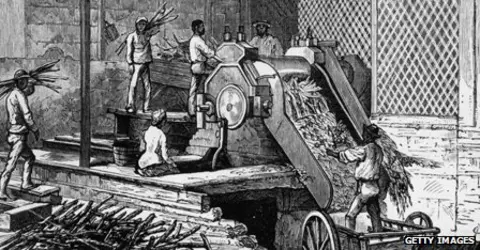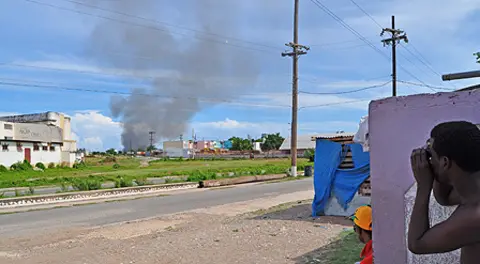Source link : https://theamericannews.net/america/jamaica/jamaica-profile-timeline/
A chronology of key events:
1494 – Christopher Columbus sights Jamaica.

Jamaica became a leading sugar exporter with the help of slave labour. Slavery was abolished in the 1830s
1509 – Jamaica occupied by the Spaniards under a licence from Columbus’s son; much of the indigenous Arawak community dies off from exposure to European diseases; African slaves brought in to work on the sugar plantations.
1655 – Jamaica is captured by the British.
1670 – Jamaica formally ceded to the British in accordance with the Treaty of Madrid.
1692 – Port Royal, once the busiest trading centre of the British West Indies and infamous for general debauchery, is devastated by an earthquake.
1838 – Slavery abolished.
1865 – The British ruthlessly put down the Morant Bay rebellion, staged by freed slaves in response to acute hardship, and force the local legislature to surrender its powers; Jamaica becomes a crown colony.
1870 – Banana plantations set up as the sugar cane industry declines in the face of competition from European beet sugar.
1884 – New constitution marks the initial revival of local autonomy.
1938 – Serious riots caused by unemployment and resentment against British racial policies; People’s National Party (PNP) founded by Norman Manley.
1944 – Universal adult suffrage introduced; new constitution providing for a popularly-elected House of Representatives promulgated.
1958 – Jamaica becomes a member of the British-sponsored Federation of the West Indies.
1961 – Jamaica withdraws from the Federation of the West Indies.
1962 – Jamaica becomes independent within the British Commonwealth with Alexander Bustamante of the Jamaica Labour Party (JLP) as prime minister.
1972 – Michael Manley becomes prime minister following an impressive victory by the PNP in the general elections and pursues a policy of economic self-reliance.
1976 – The PNP wins another term following elections marked by violence and proceeds to nationalise businesses and build closer ties with Cuba.
1980 – Edward Seaga becomes prime minister after his JLP wins general elections. He proceeds to privatise state enterprises and to distance Jamaica from Cuba. US grants Seaga government substantial aid.
1988 – Jamaica badly hit by Hurricane Gilbert.
1989 – PNP ousts JLP in elections, returning Michael Manley as prime minister. Manley, however, chooses to continue Seaga’s policy course.
1992 – Manley retires on health grounds and is succeeded by Percival J Patterson.
1993 – PNP returned to office with an increased majority.
1998 – PNP wins a third term; increase in violent crime reported as the economy deteriorates.
1999 April – Violent protests take place against a 30% increase in fuel prices.
1999 July – Government orders the army to patrol the streets of Kingston following a massive increase in crime.
2001 July – Troops and armoured vehicles move in to restore order in the capital, Kingston, after three days of unrest leave at least 27 people dead.
2002 March – Britain’s Privy Council – final court of appeal for Jamaica and other former colonies – decides to halt executions in some Caribbean countries, where capital punishment is supported as a deterrent to violent crime. Prime Minister PJ Patterson criticises the move.
2002 October – Prime Minister PJ Patterson’s People’s National Party wins general elections, ushering in fourth successive term in office for party and third term for incumbent premier.
2003 January – UK introduces visa requirement for Jamaicans entering UK; London says move is intended to tackle illegal immigration.
2004 March – Ousted former Haitian president Jean-Bertrand Aristide takes up temporary asylum, prompting an angry response from the new Haitian government.
2004 September – Hurricane Ivan – described as the biggest in living memory – pounds the island, destroying thousands of homes.
2005 September – Prime Minister PJ Patterson says he will step down by April 2006.
Opposition leads a day of protest over price increases for utilities and public transport.
2006 February – Local government minister Portia Simpson Miller is elected as head of the ruling People’s National Party. She succeeds PJ Patterson to become Jamaica’s first female PM in March.
2006 October – Government survives a confidence vote in parliament over the ruling party’s acceptance of a campaign donation from a Netherlands-based oil company.
2007 September – Jamaica Labour Party wins general elections, Bruce Golding becomes PM.

A man watches smoke rise from Tivoli Gardens during the operation to capture drug kingpin ”Dudus” Coke. Some 60 people were killed in the action
2008 November – Parliament votes to keep the death penalty, as Jamaica struggles to contain one of the world’s highest murder rates.
2010 May-June – Dozens killed in operation to arrest alleged drug lord Christopher “Dudus” Coke. He is extradited to the US, sentenced and jailed.
2011 October – Andrew Holness takes over as premier, after Golding quits, citing the ”Dudus” Coke affair.
2011 December – Portia Simpson-Miller from the People’s National Party wins a snap general election.
2012 January – On taking up office, Mrs Simpson-Miller says that 50 years after Jamaica gained its independence from Britain, it is time for the country to break with the British monarchy and become a republic.
2012 November – Jamaica abolishes flogging and whipping from its penal code.
2014 April – Anti-doping officials in Jamaica given Asafa Powell, once the world’s top sprinter, an 18-month ban for failing a drugs test.
2015 February – Parliament decriminalises the possession of small quantities of cannabis for personal use. The law also permits the use of marijuana for religious, medical and scientific purposes.
2020 September – Andrew Holness wins a second consecutive win for the Jamaica Labour Party. The JLP, which had promised a referendum on becoming a republic but not carried one out, states that holding a referendum remains a goal.
2022 – The Minister of Legal and Constitutional Affairs, Marlene Malahoo Forte, says the transition to republic is to be completed by the next general election, currently scheduled for 2025. Popular support for republicanism grows following the death of Elizabeth II.
Author :
Publish date : 2022-10-03 13:00:00
Copyright for syndicated content belongs to the linked Source.
Author : theamericannews
Publish date : 2024-12-03 17:14:14
Copyright for syndicated content belongs to the linked Source.
